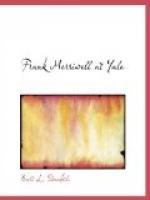In confusion Harry got up and went to look out of the window.
“Jeewhittaker! I’m glad Merry don’t get this way often!” he thought. “Never knew him to do it before.”
After some moments Frank declared:
“I am going to try to hush this Ditson matter up, Harry.”
“You are?”
“Yes, for the sake of Ditson’s mother. I want you to help me. We’ll go see Putnam and Jones. If they have told anybody, we’ll see the others. I am the one who has the greatest cause for complaint, and if I am willing to drop it, I am sure Putnam should be. Come on, old man. Let’s not lose any time.”
“Well, I suppose you are right,” admitted Harry, as he reached for his cap. “But there’s not another person on top of the earth who could induce me to keep still in such a case. It is a second offense, too.”
So they went out together, and searched for Putnam and Jones.
At first Putnam was obstinate, and utterly refused to let Ditson off; but Frank took him aside, and talked earnestly to him for fifteen minutes, finally securing his promise to keep silent. It was not difficult to silence Jones, and so the matter was hushed up for the time. Nothing was said to Ditson, who was left in suspense as to what course would be pursued.
A day or two later came the very thing that had been anticipated and discussed, since the freshman game at Cambridge. Merriwell was selected as one of the pitchers on the ’Varsity nine, and the freshmen lost him from their team.
Putnam came out frankly and confessed that he had feared something of the kind, all along, and Frank was in no mood to kick over his past treatment, so nothing was said on that point.
In the first game against a weaker team than Harvard, Merriwell was tried in the box and pitched a superb game, which Yale won in a walk.
Big Hugh Heffiner, the regular pitcher, whose arm was in a bad way, complimented Merriwell on his work, which he said was “simply great.”
Of course Frank felt well, as for him there was no sport he admired so much as baseball; but he remained the same old Merriwell, and his freshmen comrades could not see the least change in his manner.
The second game of the series with Harvard came off within a week, but Frank got cold in his arm, and he was not in the best possible condition to go into the box. This he told Pierson, and as Heffiner had almost entirely recovered, Frank was left on the bench.
The ’Varsity team had another pitcher, who was known as Dad Hicks. He was a man about twenty-eight years old, and looked even older, hence the nickname of Dad.
This man was most erratic and could not be relied upon. Sometimes he would do brilliant work, and at other time children could have batted him all over the lot. He was used only in desperate emergencies, and could not be counted on in a pinch.
During the whole of the second game with Harvard Frank sat on the bench, ready to go into the box if called on. At first it looked as if he would have to go in, for the Harvard boys fell upon Heffiner and pounded him severely for two innings. Then Hugh braced up and pitched the game through to the end in brilliant style, Yale winning by a score of ten to seven.




